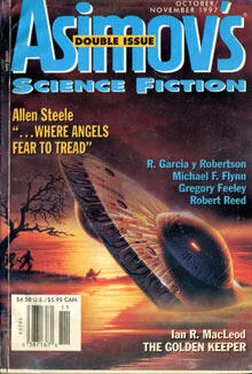Gregory Feeley - On the Ice Islands
Здесь есть возможность читать онлайн «Gregory Feeley - On the Ice Islands» весь текст электронной книги совершенно бесплатно (целиком полную версию без сокращений). В некоторых случаях можно слушать аудио, скачать через торрент в формате fb2 и присутствует краткое содержание. Год выпуска: 1997, Издательство: Dell Magazines, Жанр: Фантастика и фэнтези, на английском языке. Описание произведения, (предисловие) а так же отзывы посетителей доступны на портале библиотеки ЛибКат.
- Название:On the Ice Islands
- Автор:
- Издательство:Dell Magazines
- Жанр:
- Год:1997
- ISBN:нет данных
- Рейтинг книги:4 / 5. Голосов: 1
-
Избранное:Добавить в избранное
- Отзывы:
-
Ваша оценка:
- 80
- 1
- 2
- 3
- 4
- 5
On the Ice Islands: краткое содержание, описание и аннотация
Предлагаем к чтению аннотацию, описание, краткое содержание или предисловие (зависит от того, что написал сам автор книги «On the Ice Islands»). Если вы не нашли необходимую информацию о книге — напишите в комментариях, мы постараемся отыскать её.
anti numerous essays and short stories, he tells us he has found himself “increasingly drawn to the novella form. My latest, ‘The Weighing of Ayre,’ has just been reprinted in
and is currently a nominee for the Theodore Sturgeon award.” In his marrow-chilling new tale of death and deception, Mr. Feeley reveals just how terribly cold it is to be stranded…?
On the Ice Islands — читать онлайн бесплатно полную книгу (весь текст) целиком
Ниже представлен текст книги, разбитый по страницам. Система сохранения места последней прочитанной страницы, позволяет с удобством читать онлайн бесплатно книгу «On the Ice Islands», без необходимости каждый раз заново искать на чём Вы остановились. Поставьте закладку, и сможете в любой момент перейти на страницу, на которой закончили чтение.
Интервал:
Закладка:
Grimly Yarrow recalled the codes and studied them. The fault, according to her clensuit, lay in the powerbox: something was preventing its proper discharge. Her system duly listed the various attempts it had made to overcome this, none of which Yarrow was competent to judge. At the bottom of the list appeared the results of its efforts: Suit power was now at 21.3 percent.
“At present expenditure levels, how long until suit failure?” she asked the system.
“Lethal failure in two point six hours,” her suit replied.
Walking on the surface, of course, would accelerate energy expenditure. Yarrow sighed, then ordered her suit to heat up a cup of strong tea. Swallowing a mouthful of fruit paste, she told herself to wake up, then set about finding the trail of cleat-marks that would lead her back to the duster.
“Recorder on,” she said. Between sips of tea she recounted recent events, including her suspicion that the Voice had managed to disrupt the emergency powerboxes. “It’s a cold way to die,” she remarked bitterly. She felt a stab of envy for Chow, dispatched to eternity by the grinding hydrodynamics of a true if tiny world.
Yarrow found a second powerbox near the excavation site, but was again unable to coax current from it. If the Voice had sent her blacked-out clensuit to establish connections extending its control over the power grid, she would not be able to undo it from here. She followed the branching gliderail back toward the duster, taking care not to touch it.
“There it is,” she said as the craft’s rounded tip broke the ragged horizon. No searchlight shone, but Yarrow was certain that the ship’s instrumentation could detect her. She decided to leave the recorder on, an unwashed creek bed that the next few minutes would etch.
Like an enemy fortress, the duster loomed up in the night sky, discernible as much by the stars it occluded as by their dim reflection. Yarrow approached cautiously, trying to remember where she had stood when clensuit control was wrested from her. She had been only a few steps from the hatch—which did not guarantee that the Voice’s range of control did not extend farther.
“Hello the Ship,” Yarrow ventured. There was no reply. She hailed the Onboard electronically, and was rewarded with a standard acknowledgment. Emboldened, she ordered the hatch to open.
Nothing happened.
Yarrow took a breath and started forward. “Advancing slowly,” she reported. In fact she was approaching in a wide spiral, like a housebreaker looking for a back entrance. The ground beneath the hatch showed smooth plate like a paved walkway, which she avoided. The duster’s three legs nestled snugly into the docking collar’s fitted recesses, holding the craft fast as though against a hurricane. Yarrow considered climbing one, then remembered that the yaw rockets rested atop each.
A stack of leftover material stood beside the landing platform, and she picked up a meter-long metal rod and secured it to her belt. Finger-sized joint fasteners lay discarded nearby, which she stuffed into her pouch. She wondered if the Voice was observing this, and whether it would realize what she was about. Quickly she stood, took half a step toward the craft, then flexed her knees lightly and hopped.
She rose lazily, drifting past the rocket nozzles with aching slowness, but continued with almost undiminished momentum to the tip of the duster and beyond. She was three times the ship’s height before she felt herself slow at last to a stop and hang over the starlit icescape, as though her body were straining to detect the comet’s faint gravity.
Her descent began almost imperceptibly, allowing her ample time to study its path. Deciding that she would overshoot the duster by several meters, she took out a fastener and flung it away on a flat tangent. Her course seemed little altered by this, and she hurled two more into her path, wishing she had something more massive. Below her, the antenna complex protruded like an askew weathervane from the duster’s smooth surface. She was descending toward the duster’s bow, a featureless hemisphere that would permit no purchase. Coming down lightly, Yarrow kicked off with one foot, sending her up a few meters in the proper direction. The antenna passed below her, a tangle of electronics like a wind-gnarled tree growing from a stony outcrop. She had her cord ready in one hand, but it proved unnecessary; her outstretched arm snagged a boom and she pulled herself in.
“The vulture’s perch,” she muttered, reaching down to feel among the instrumentation. Upon waking she had realized that the Voice must be controlling the ship’s Onboard remotely, so could be balked by disabling its receivers. Looping the cord around a strut, she secured the other end to her belt, then braced her feet and hefted the metal rod. She identified a vulnerable spot behind the antenna dish, swung back the rod, and brought it down hard.
The shock of the blast threw her backward, every thought knocked from her head. The clensuit was shrilling, but Yarrow didn’t hear it. A timeless interval followed, of effortless floating and absence of pain or thought. It was only when she bounced, once and then again, and came lightly to rest on a rough chilly surface that the world of inevitable consequence returned.
Get up. It was an urgent voice, more intimate than the clensuit’s in her ear. Yarrow groaned, although pain had not yet arrived.
You’re dying, get up. It seemed a non sequitur, and Yarrow puzzled slightly, as one might recall an odd remark from the night before. Don’t die not fighting: Up.
The pain came then, like sunshine burning through fog. The underside of her body was growing quite cold, which was welcome, since every joint and sinew ached as though sawn. This was wrong, Yarrow thought confusedly; and then sharper pain sliced through the gauze of her befuddlement.
Up, yes. Getting up was easy in microgravity; and the cold seeping through the ice (she reahzed that she was lying on the ground) was beginning to ache on the peripheries of numbness. Yarrow rose to a sitting position and nearly cried out. The searing gust raced beneath her suit like a flame.
Her faceplate glowed dimly with electronic noise, and her suit’s joints moved with difficulty. The clensuit was dead, its systems fried. Standing unsteadily, Yarrow could feel her soles chilling, while the rest of her body failed to warm.
Something brushed against her thigh, and she held up the end of her cord, its ragged end charred. Had she not been tethered by it, the shock of the blast might have thrown her into escape orbit. Or possibly the voltage would have killed her outright.
She might well be dead in another minute, anyway.
The ship; in. Yarrow turned until she saw the ship, a dozen meters away and seemingly unchanged in the dim light. The antenna, of course, had been destroyed by the surge the Voice had sent through it. Never mind that now. In or die here. Her air was growing stale, and cold.
Three low leaps brought her to the docking collar. She did not trouble to avoid the metal plating, through which the Voice had earlier taken over her suit. Having destroyed the antenna, it had lost access to the ship, a limb it had sawn off to see her fall.
She could not send a radio signal to open the airlock, but the hatch possessed manual controls. Swarming up the ladder, oblivious to the pain in her hands but alert to the worsening air, Yarrow reached the control pad and tapped out the emergency entry code.
Nothing happened.
Yarrow didn’t think, didn’t wait for the orders in her ear. The screw-driver in her glove would not extrude, but she was able to work it out with her finger, like a child pushing out a splinter. The threads holding the coverplate in place would not respond to random vibration, but the microscopic pressure sensors lining the helices detected the directed effort of a tool blade and allowed the screws to turn. Four screws off, and the coverplate drifted free.
Читать дальшеИнтервал:
Закладка:
Похожие книги на «On the Ice Islands»
Представляем Вашему вниманию похожие книги на «On the Ice Islands» списком для выбора. Мы отобрали схожую по названию и смыслу литературу в надежде предоставить читателям больше вариантов отыскать новые, интересные, ещё непрочитанные произведения.
Обсуждение, отзывы о книге «On the Ice Islands» и просто собственные мнения читателей. Оставьте ваши комментарии, напишите, что Вы думаете о произведении, его смысле или главных героях. Укажите что конкретно понравилось, а что нет, и почему Вы так считаете.












